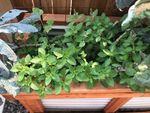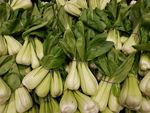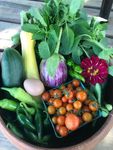Garden Plot Meal Plan - 2022 GARDEN PLANNING GOLD FEATHER GARDENS
←
→
Page content transcription
If your browser does not render page correctly, please read the page content below
GOLD FEATHER GARDENS
Don't know where to begin when
planning out your garden?
Start planning your garden by writing out
your typical meal plan's ingredients
Then, highlight the ingredients you know you want to grow (e.g. spinach, kale, thyme, rosemary)
Recipe No. 1 Recipe No. 2 Recipe No. 3
Recipe No. 4 Recipe No. 5 Recipe No. 6GOLD FEATHER GARDENS
Need some inspiration?
Here are my favorite go-to recipes, with the
ingredients I always grow highlighted.
Grab your favorite cookbooks, blog sites or recipe cards to fill out your own!
Recipe No. 1 Recipe No. 2 Recipe No. 3
Herby Eggs + Crispy Kale Farmer's Chop Suey Owen's Salsa Verde
parsley Radish Tomatillo
oregano Turnip Onion + Garlic
sage Green Onions Lime Juice
eggs Carrots Jalapeno
kale Greek Yogurt/Sour Cream Cilantro
Recipe No. 4 Recipe No. 5 Recipe No. 6
Garden Pizza Party Summer Roll Bowl Go-To Greek Salad
Pizza dough basil + mint red onion
oregano rice noodles cucumber and tomato
tomato sauce green onions oregano
cheese cucumbers feta
arugula bell peppers lemon juice, red wine vinegarGOLD FEATHER GARDENS
Gardening in Boise
What you can grow in Boise and when
With more than 200 days of annual sunshine and mild winters, Boise offers an ideal
climate for kitchen gardeners to grow year round. That's right, there's no end to garden
season for the Treasure Valley! Here's a glimpse of what you can grow and when.
WINTER SPRING
SUMMER FALL
But wait, isn't it too cold to
grow in the winter?
Boise's winter is mild enough that we don't have a true cold season (where temps
are below freezing to just over 40 degrees on average). Some stretches of winter
can certainly get below freezing for extended periods, but on average, winters are
mild and snow doesn't stick around. Simple row covers or cold frames allow us to
utilize the warm sunny days we usually see and protect our cold-hardy plants
from deep freezes. This means we can harvest herbs and greens in the winter.GOLD FEATHER GARDENS
There's so much to grow
and so much time to grow it in
Boise's climate can be tricky, but once you understand the seasons, their temperatures
and their quirks, it's easy to be prepared for all that can happen in 365 days. Keeping
row covers or cold frames handy extends the seasons and keeps the bounty growing.
Winter
Boiseans are famous for saying that you can ski and golf in one winter's day!
Our winter is mostly mild and sometimes unpredictable, but with average high
temperatures hovering around 40, Boise winters can allow year-round growing
with the right row covers, cold frames or greenhouses. We can grow or over-
winter cold-tolerant vegetables like kale, cabbage, spinach, lettuce, leeks,
turnips, radishes, carrots, broccoli, cauliflower, parsnips and Brussels sprouts.
Spring
In Spring, Boise's longer, warmer days make it a great time to keep growing the
winter crops, while mixing in some geared for warmer weather. March, April and
May are excellent months for sowing herbs like cilantro, dill, parsley, chives,
rosemary and, of course, sage. Roots crops continue to do well in spring, like
radishes, carrots and turnips, while salad greens, spinach, kales and lettuces
truly take off. Spring snap peas are one of our favorite early spring growers,
while the first flowers bloom in spring, from anemones to ranunculus and tulips.
Summer
Boise summers are hot and dry, so irrigation is a must for consistent and waste-
free watering. June is when we see our tomatoes, corn and squash grow like
crazy. We do have two months in the summer where our highs are above 85
degrees (July and August), so sweet potatoes and okra do well. Peppers,
tomatoes, melons and cut flowers like zinnias and sunflowers are certain
favorites, while Idaho potatoes are, of course, flowering in gardens all over town.
Fall
In September, temperatures in Boise are absolutely perfect for being outside
and for growing. Tomatoes, peppers and winter squash flush with fruit as the
daytime temperatures fall below 90. Our long fall season is an excellent time to
grow greens, peas and root crops again. We sow kale, lettuce, radishes, turnips,
carrots and more to eat in the fall and to overwinter. Keeping frost blankets
handy near the beginning of October means our season can extend, as well.
WWW.GOLDFEATHERGARDENS.COMYou can also read



























































